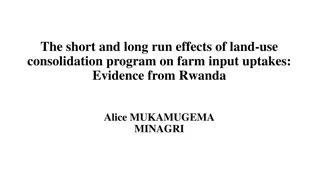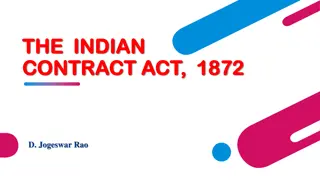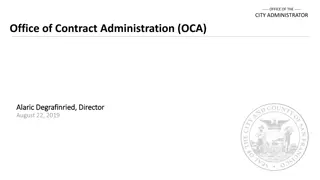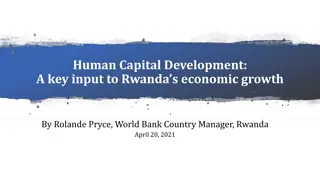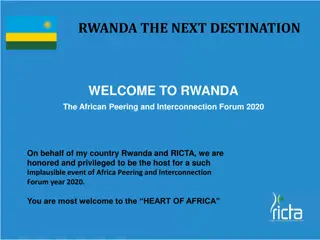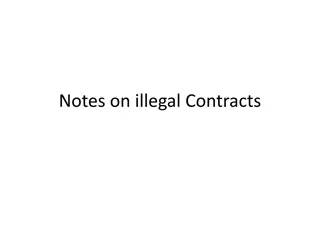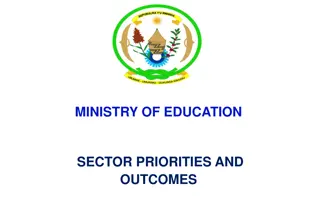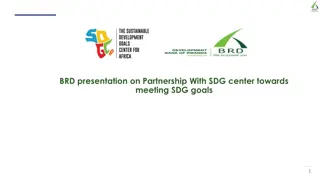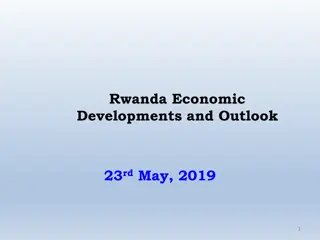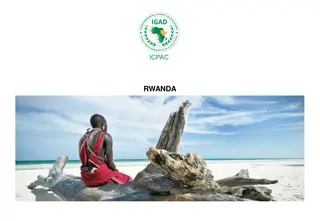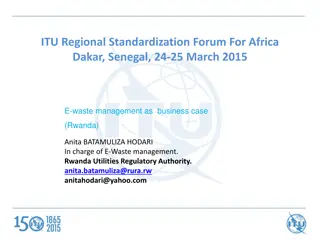Rwanda's Imihigo Performance Contracts: A Path to Accountability and Development
Rwanda's Imihigo are performance contracts between the President and government agencies, aimed at improving governance, justice, and economic indicators. Implemented since 2006, Imihigo hold leaders accountable, promote stakeholder ownership, transparency, and result-oriented performance, emphasizing regular evaluation. The methodology involves a participatory approach from grassroots to national levels, with assessments conducted by a dedicated team.
Download Presentation

Please find below an Image/Link to download the presentation.
The content on the website is provided AS IS for your information and personal use only. It may not be sold, licensed, or shared on other websites without obtaining consent from the author. Download presentation by click this link. If you encounter any issues during the download, it is possible that the publisher has removed the file from their server.
E N D
Presentation Transcript
Rwanda Performance Contract mechanism AFRICASAN Conference, Dakar May 2015
Introduction & Background Performance contracts Imihigo are contracts between the President of Rwanda and government agencies detailing what the respective institution sets itself as targets on a number of governance, justice, economic and social indicators. The stated objective of Imihigo is to improve the speed and quality of execution of government programs, thus making public agencies more effective.
Introduction & Background Every year, since 2006, Imihigo performance contracts are evaluated to inform the Government on the relevance of the government s interventions in changing people s lives. Whether the public spending makes difference or value for the money, what policy or program works well, if policy makers are able to judge on the merit or worth of an intervention, among others. Over time, Imihigo have become institutionalised as a means to keep local leaders accountable to their communities and the Government.
Definition Imihigo is the plural Kinyarwanda word of Umuhigo , which means to vow to deliver. Imihigo also includes the concept of Guhiganwa , which means to compete among one another. Imihigo describes the pre-colonial cultural practice in Rwanda where an individual sets targets or goals to be achieved within a specific period of time. The person must complete these objectives by following guiding principles and be determined to overcome any possible challenges that arise.
Objectives To speed up implementation of the local and national development agenda To ensure stakeholder ownership of the development agenda To promote accountability and transparency To promote result-oriented performance To promote innovation and competitiveness To engage stakeholders (citizens, civil society, donors, private sector, etc) in policy formulation and evaluation To promote zeal and determination to achieve set goals To emphasize the culture of regular performance evaluation
Methodology Imihigo is the result of a participatory process of identifying and implementing priorities from the grassroots to the national level. In the process of identifying priorities, each level demonstrates its contribution development goals. For more on the methodology visit: Imihigo _ Rwandapedia.htm The assessment of Imihigo is done by a team comprised by members from the President s Office, Prime Minister s Office, Ministry of Local Government, and Ministry of Finance and Economic Planning. to achievement of
Impact of Imihigo Over the EDPRS 1 period, the average real GDP growth rate was 8.2 % and poverty was reduced from 56.7 % to 44.9 % between 2006 and 2011. Access to improved sanitation increased from 52% in 2000/01 to 75% in 2010/11. Access to education and health services have become universal with 96% of school-aged children now enrolled in primary school, and 90% coverage of health insurance
Impact of Imihigo Indicators Achievements Kilometers of water pipe lines installed 2,978.37 Number of family toilette constructed 9,625 Number of piped schemes constructed 27 Number of public toilette (ECOSAN) constructed 129 Number of pumps installed 15 Number of reservoirs constructed 162 Number of water points constructed 645
Impact of Imihigo Indicators Achievements 2012/2013 Number of new latrines constructed 2,478 Number of new nursery classrooms constructed 42 Number of new primary classrooms constructed 985 Number of new secondary classrooms constructed (12YBE) 196 Number of new vocational training center (s) constructed 3 Number of teachers / administrative blocks constructed 197
Overall Score (%) 77.0 76.175.875.7 75.775.6 76.0 75.275.1 75.1 74.7 74.774.674.574.474.374.273.973.773.673.573.473.3 75.0 74.0 72.9 73.0 72.272.171.8 71.871.771.6 71.6 72.0 70.7 71.0 70.0 69.0 68.0
Lessons learnt The tradition of Imihigo has improved development planning in the broad sense. Improvements in priority setting and coordination with the relevant administrative levels and entities The central and local government have enhanced extent of consultation which ensures a sense of common purpose. Shared responsibilities Ownership of local challenges by citizens
Recommendations To implementation mechanism) Study tour to Rwanda to see in more details, how Imihigo is implemented in the Country other Countries we simply (performance recommend the of Imihigo contract
Mayor of Kicukiro District being awarded by H.E Paul Kagame during last year Imihigo evaluation
Signing of the first Imihigo between H.E Paul Kagame and Mayors of Districts in 2006
THANK YOU MURAKOZE




